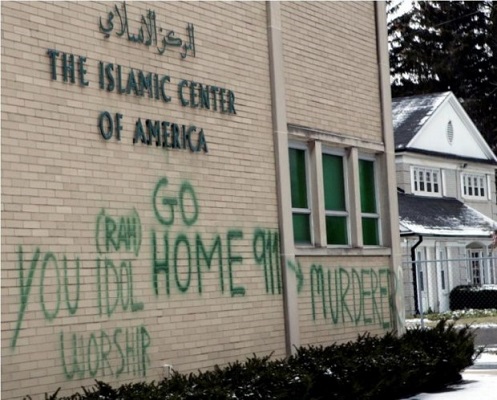
By: Huizhong Wu
Source: mashable.com
“You’re a terrorist, every one of you is a terrorist, I don’t care what you say,” said one man at a meeting for the construction of a mosque in Virginia on Tuesday. “Every Muslim is a terrorist.”
While mourning with the rest of the world for Paris, American Muslims are also preparing themselves for a state of vigilance and caution, as anti-Muslim incidents and sentiments spread. Muslims have been the targets in a series of incidents since the Nov. 13 attacks in Paris left 129 dead and hundreds injured. On Sunday, police responded to a report of a shooting at a Muslim family’s house in Florida (no one was home when the shooting occurred). On Monday, worshippers found a defaced Quran, smeared in feces, in the doorway of a small mosque near Austin, Texas.
The atmosphere is made worse, some Muslims say, with 31 state governors and other politicians issuing statements against Syrian refugees. The political rhetoric has ranged from presidential candidate Ted Cruz’s comment that the U.S. should only accept Christians from Syria as “there is no meaningful risk of Christians committing acts of terror” to Wisconsin Gov. Scott Walker’s concerns about national security — “In light of these horrific and tragic attacks, our first priority must be to protect our citizens.”
The political rhetoric only compounds the situation, said Madihha Ahussain, a staff attorney at Muslim Advocates. “It’s one thing to have individuals who are motivated by bias, but when you have elected officials saying Muslim refugees are the ones that are responsible for these type of violent acts…it’s basically a free-for-all for targeting Muslims.”
Comments against Muslims have also been widespread on social media.
These type of negative comments on social media are emotionally draining, said Margari Hill, the programming director of the Muslim Anti-Racism Collaborative.
“To know that my faith would make me unwanted in America is a very difficult message” to hear, Hill said. “It just goes against everything I believe as an American.”
The hostility and fear do not only hurt Muslims. A Canadian Sikh man found himself the target of online attacks when his picture was Photoshopped to make him look like a suicide bomber. Some European media outlets mistakenly published his photo as one of the potential attackers behind the killings in Paris.
Yet, the present environment of fear and accusation is nothing new.
“It’s gotten really old,” said Faisal Naeem, a board member of the Islamic Center of Pflugerville, where the defaced Quran was found. “That blame, whether you’re involved or not involved, is a constant state of mind for Muslims. It’s a constant state of mind that I’m supposed to answer for somebody overseas.”
Ahussain said her friends who wear the hijab are reminded of the time after 9/11 when questions and fears about Muslims became widespread and when they became conscious of wearing a hijab outside.
That period was also a time of increased violence.
After 9/11, hate crimes against Muslims jumped from 28 incidents in 2000 to 481 in 2001, according to the Federal Bureau of Investigation. Unsurprisingly, “after terrorist attacks we’ve seen an uptick in hate crimes and bias related incidents against religious minorities, especially American Muslims and American Sikhs,” said Arjun Singh, director of law and policy at the Sikh Coalition.
The FBI’s most recent report, which tracked data for 2014, showed that the number of anti-Islamic hate crimes have remained steady in the past few years.
While many say the FBI’s statistics underreport the actual number of hate crimes, some experts say that it can be indicative of general trends. Although the data for 2015 is not yet available, it is probable that the number of attacks will rise again, according to the Southern Poverty Law Center.
“This week’s climate of fear and alarming rhetoric from government officials, from governors to mayors, is like living the trauma of 9/11 all over again,” Hill said.



